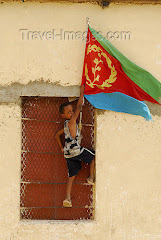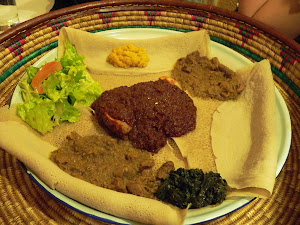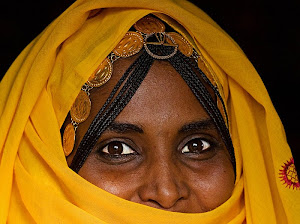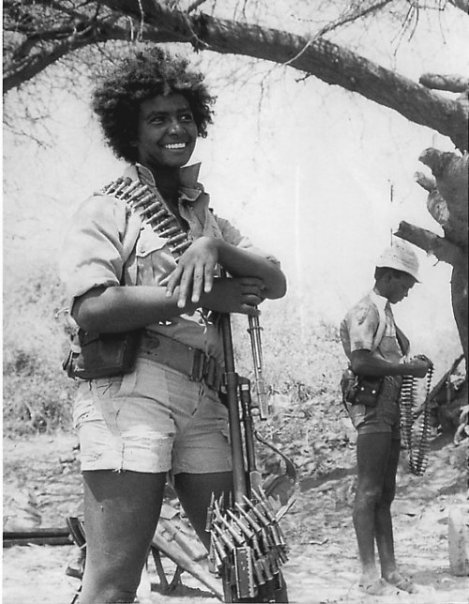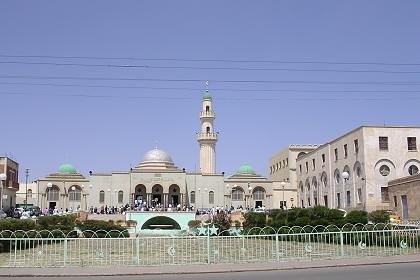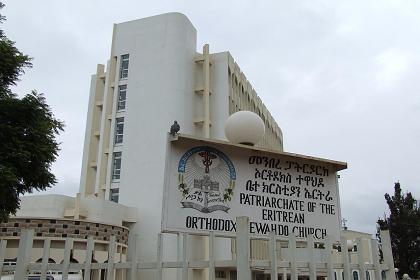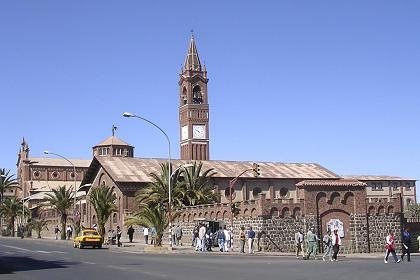Sunday, October 28, 2007
War brews on the new frontier by Michela Wrong
A grim deadline expires in a few weeks' time. It will pass unnoticed by the British public, but that doesn't make it any less important, not just for the two nations involved, but for Africa as a whole. For it sets the seal on an abject failure by the west to ensure that a vital African ally respects international law. And the act of defiance our governments have chosen to ignore will undermine peacemaking on the continent for decades to come.
At the end of November, the frontier separating Eritrea from Ethiopia becomes officially demarcated, in the teeth of Ethiopian opposition. For five years, Addis Ababa has done its best to prevent cement pillars being placed along a line designated by the international Eritrea-Ethiopia Boundary Commission in April 2002, a ruling that both states originally agreed was to be final and binding. The exasperated commission chairman, Sir Elihu Lauterpacht, announced last November that if the stalemate continued, the border would automatically count as legally demarcated a year hence, pillars or no.
With that announcement, Lauterpacht in effect told the international community: "We've done our bit. The rest is up to you." Its mandate complete, the commission will disband. Law yers, however distinguished, can do only so much. Ever since it emerged that the commission's ruling placed the contested town of Badme, of huge symbolic importance as the flashpoint of the 1998-2000 war, inside Eritrean territory, it has been clear that only realpolitik could secure Ethiopian compliance.
Those five years of procrastination did not come cheap for you and me. A UN peacekeeping force has been deployed along a buffer zone between the two states throughout, at a cost to western taxpayers of more than $1bn. All for naught, because a new war now looks horribly likely. Both sides have moved troops up to the border and Ethiopia recently announced that it was considering terminating the Algiers Agreement, which ended the fighting in 2000. The rising rhetoric feels like an ominous countdown to a resumption of hostilities.
Could all this have been avoided? Outsiders often claim both governments are so pig-headed that outside pressure either has no effect or backfires. But the west never tried. A US diplomat friend used to accuse me of naivety when I struggled to interpret governments' behaviour. "Look at what they do, not what they say," he would scold. The Addis regime looked at what the west did when confronted by its defiance, not what it said, and concluded - correctly - that it had nothing to fear from continued intransigence.
Since the days of Haile Selassie, giant, Christian Ethiopia has been regarded as the Horn of Africa state the west had to keep onside, too big, too strategic, too poor to ignore. The war on terror buttressed that belief, notwithstanding evidence that Addis Ababa's aggressive behaviour was destabilising the region.
So, after Ethiopian troops shot nearly 200 de monstrators protesting against rigged elections and jailed the opposition, western donors made only token adjustments to the $1.9bn in funding they give Prime Minister Meles Zenawi each year. Any disapproval Washington might have expressed over Ethiopia's invasion of Somalia rang hollow, given the enthusiastic help it lent the army as it hunted retreating Islamist forces. And Ethiopia's warning that it might terminate the Algiers Agreement came soon after the US state department said it was preparing to put Eritrea on its list of terrorism-supporting states for its role in Somalia: a green light to Addis if ever there was one. What they do, not what they say.
One doesn't have to be an admirer of the Eri trean government - undemocratic, stiflingly militaristic, cynically ready to support any rebel group that threatens Meles - to quail at the ramifications of the west's limp behaviour. By indulging a delinquent favourite, the inter national community has set a precedent other regional bullies will happily follow. We can expect a repeat next door in Sudan, where the government and the rebels have yet to demarcate the frontier separating south from north. The Eritrea-Ethiopia dispute was bitter enough. In Sudan, oil pushes the stakes even higher. Khartoum has already refused to implement a "final and binding" ruling defining the limits of oil-rich Abyei Province. What is the likelihood of its complying with any border ruling that locates oil deposits out of reach in the south?
Africa as we know it is a recent invention. Quixotic and impractical, its colonial frontiers are poorly charted and easily challenged. Fear of the mayhem that would ensue if member states regarded existing boundaries as being up for debate prom pted the Organisation of African Unity, in 1964, to embrace the doctrine of uti possidetis, that colonial borders should remain as they are. The Eritrea-Ethiopia debacle, which will be finalised next month, undermines that principle, weakening future attempts at peaceful arbitration. The message it sends is that "final and binding" frontier rulings are negotiable; and that while minnows must obey international law, large countries with friends abroad can defy it with impunity. There could be few more dangerous signals to send a fragile continent.
Monday, October 22, 2007
Who Really Cares for Darfur?
The process of divestment works like this. STAND has identified 27 companies as a target for the program. These are the companies, which are making business with the government of Sudan (GOS), and thereby helping the government to finance the genocide. Almost all the companies are China and Southeast Asia companies. STAND first asks these companies to stop their business with the GOS. If they didn’t stop, then they go into the next phase of the process. They advocates for states, universities, union organizations and other associations who have large investment funds to withdraw their investments from these companies. If they succeed in convincing many investors to withdraw their investment from these companies, the stocks of these companies will fall and this will hurt the profitability of the companies. So far, 52 universities and 13 states have divested from companies that operate in Sudan. Eventually, this is expected to force these companies to withdraw their operation from Sudan. In turn, the government of Sudan will lose its source of revenue and will be forced either from office or make peace deal to stop the genocide. This is in summary of the process.
My first observation is that I was surprised by the interest of the young students who took the case seriously and commit them selves to help the people of Darfur. This kind of movement is only available in the so-called western world, and I consider it a very positive part of their system. Wouldn’t it be wonderful if the Chinese’ students form the same coalition?
My second observation is that out of some over 50 students in the conference, we were only two black students. I have now learned that black students prefer to avoid seminars about Africa, because invariably, they portray an ugly image of Africa only.
My third observation is that this is not the best solution for the Darfurian. This process is very slow. It took 11 years in the case of South Africa. It will be unbearable pain for the Darfurian displaced from their land to wait for the process to resolve their problem. It would be better for STAND to come with a different program.
The most effective way to solve the problem of the Darfurian, is to deploy a peace keeping force in Darfur and bring the people to their homes from the refugee comps. The problem to this process is the politics between Sudan and the west, especially US and UK. Sudan has demanded any peacekeeping force should come only from Africa and rejected any western forces in the peacekeeping force. The west, on the other hand has insisted in sending their force. And here is where the question comes. Why is the west insisting in sending their soldiers? The official reason is that African forces are not fit to handle the situation in Darfur. Sudan says otherwise. Sudan has explained its suspicion of western forces. It sees it as a neocolonial attempt to control over its huge resource.
The African union, the Arab league and neighboring countries have supported the position of Sudan.(It is possible though, these countries are supporting Sudan from their own interest with out regard to the issue of Darfurian). Sudan’s suspicion has some ground behind it. One has to ask “are African forces really not qualified to handle the situation in Darfur?” And why is the west insisting in sending their forces for two years now, despite the urgency of the situation? Darfur rebels and the janhuwit are not among the most well organized rebels in Africa. They are poorly trained and equipped to challenge a formal force. One has also to remember that the United States is mobilizing an African peacekeeping for Somalia. Every one knows the warlords in Somalia are more fierce than the Janjuwit or Darfur rebels.(a western led peacekeeping force was forced out from Somalia in 1993 by the warlords). If the United States believes an African Force is fit to handle the situation in Somalia, the argument that African forces are not fit for peacekeeping in Darfur is weak. Add to that Sudan’s suspicion: its bad relation with the west for the last 20 years, that all of its oil is exported to china and the west doesn’t get any share of it, that the US is arming and training the South Sudan army (another problem in Sudan), and that China and the west are in fierce competition for African oil, one wonders if the west’s ordeal in the name of Darfur is genuine.
And perhaps, the African force is fit enough to keep peace in Darfur. The Darfurians don’t care whether it is white or a black peacekeeping force, as long as they got their homes safely and quickly. And if the west had accepted that idea of African peacekeeping, the Darfurians may have already been returned to their home. And may be STAND has to asks their government (US) to accept the proposal of sending African force.
Thursday, October 4, 2007
REALLY?
Hey guys!!! It has been very long time since I updated this blog and some of you have been reminding and encouraging me. I appreciate that. Part of the list of excuses for interrupting is…”once you stopped it, it is harder to start it again”…of course u may not buy that excuse.
But today I got a small kick to begin it. I was attending a seminar series in the Department of Economics. The speaker was a New York Times columnist by the name David Leonhardt. He was giving a seminar about a new field of study that getting popular in social sciences called the “Economics of Life”. He said, among other things, the new field has two parts: Really and incentives matter.
These are not new in a sense, but have got some twist by some researcher and thus are popping up. I am not going to report about his seminar: but I felt we need the two words badly in ER and thus I will say some thing about them. For today, I will write about the first: Really? Hummm that sounds good. Really?
David indicted that popularly held views are questioned in this new field and these studies suggest that most of the time these views are not correct. People often base their argument, and sometimes their believe, simply because it is believed by the majority: or because it is so popular, that they fail to question them. The truth of the matter is most of the time these views turned out to be incorrect. Studies that question such misleading popular views are categorized under this new field.
The message is simple: “ don’t take any thing at face value. Don’t base your arguments on unfounded, but largely held views. Instead use to question and try to find facts.”
For most of us, we may not have the drive to ask and challenge against largely believed views. And we may not say “really?” every time we came across these views.
But there are many occasions that make you say "Really?". Sometimes we get really pieced off when somebody try to sell us their garbage ideas. In fact it is an insult and when you don't have the courage to challenge, what do u say? then comes "Really?". and that is my favorite time to say "Really? Take this example:
Dimtsi Hafash on May 2004: “ Many parents have called the ministry of information to express their outrage about the content of internet cafes that are spoiling their kids and demanded for the government to close the internet cafes.”
REALLY?
Here is another example:
Last month PIA was making interview with TV-ER about the relationship with US and Mana Kidane asked him this: “ why is Eritrea criticizing the United States while everyone is quite? PIA answered this:
“ In fact they should be happy about that because our criticism helps them”
REALLY? What about criticism against you?
So, here I am, in my small rooming writing this piece for Friday night when suddenly my cell phone range. It was from a girl that I know and she picked a topic that we disagreed last week. I was not convinced by some of the stuffs she told me about her and that pieced her off. So today she told me this:
“ Mike! I am down to earth open person. Don’t interpret the things I told you from different corners. Take them at face value”
REALLY?



